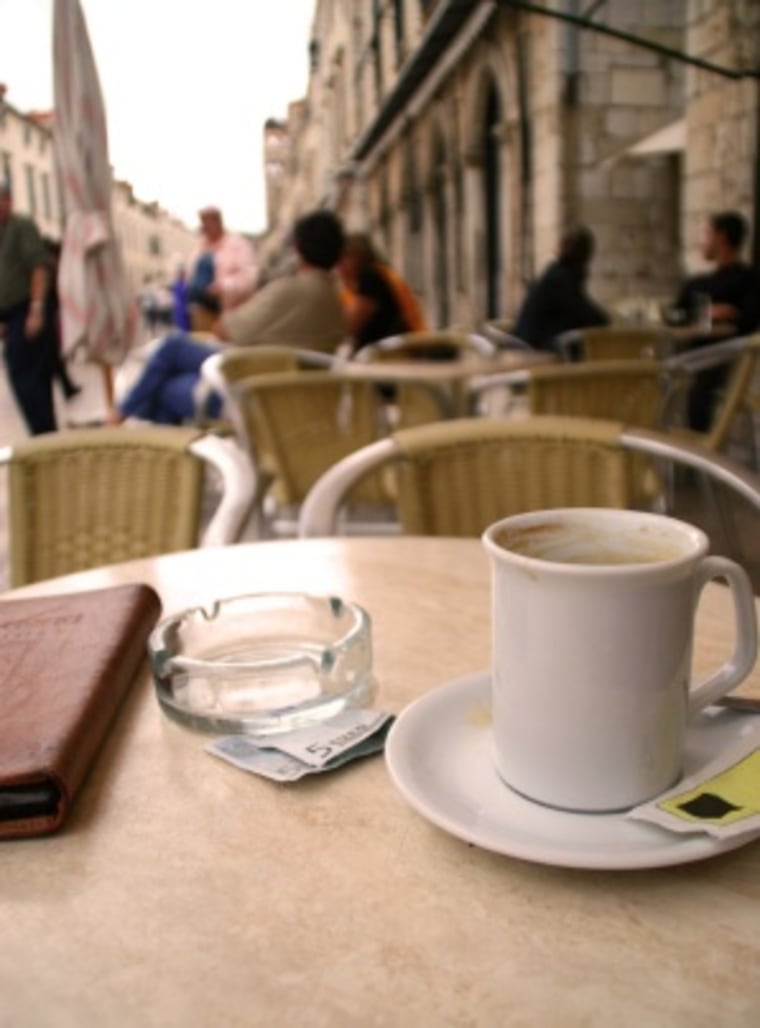Tipping conundrums are everywhere. Should you tip the valet when you drop off your car and when you pick it up? If the service is atrocious, is it okay to stiff the waiter? In which countries is a gratuity automatically included in a restaurant bill? Hotels have started to add an 18 to 20 percent charge to room-service bills; do you still need to tip the person who delivers your meal?
For some of these questions, the answers are relatively straightforward. The rule for valet parking, regardless of where you are, is to tip only when you pick up your car (valet tips are generally pooled, anyway). If you’re keen on getting white-glove treatment for your vehicle, go ahead and tip up front.
Other gratuity issues are cloudier. In American restaurants, the majority of customers are now tipping 20 percent versus the former standard of 15 percent, according to Peter Post, director of the Emily Post Institute (and great-grandson of the famous etiquette expert) and author of Essential Manners for Men. He says the change is primarily due to convenience: Doing the math with 20 percent is easier, especially after that glass of dessert wine (most sources suggest calculating on the pretax amount). Post emphasizes that diners should always leave something, even if the soup ended up in someone’s lap, because tips typically make up the majority of a server’s income. “There’s a contract between you and the restaurant” that implies you will subsidize the waiters’ earnings, he says. “You could also be penalizing the waiter when the problem was with the busboy.” Instead of denying a tip, Post recommends asking to see the manager to express your unhappiness.
Many European servers have benefited from unwitting American largesse, because on much of the Continent, service is compris, einbegriffen, incluso, incluido. No 20 percent here: rounding up the check, or leaving some pocket change on the table, is the norm. If a server has accommodated special requests, give a bit more. Tips are often slightly higher in the U.K. and Eastern Europe, where it’s appropriate to leave between 10 and 15 percent. The same is true for much of the Middle East. In some Asian countries, tipping the server is a no-no. In Japan, where gratuities in general are rare, it’s perceived as rude and in bad taste. And it was illegal in China into the 1980’s, though the practice is becoming acceptable in the more Westernized tourist destinations, as well as in Hong Kong.
As for room service, that nonoptional 18 to 20 percent charge may or may not go to the room-service attendant, depending on the hotel. Some establishments divide the fee among the servers and the kitchen staff. Others funnel the money straight to management—in particular when it’s labeled “service charge” rather than “gratuity.” If you want to be a stickler, call the front desk to find out the hotel’s policy. An easier option is just to ask the meal server—or simply hand over a bit of cash. And don’t forget the porter. Some sources suggest $5 as the minimum tip for a bellman. This may come as a surprise to people used to doling out $1 per bag, but gratuity inflation is a fact for today’s traveler. A little less money, though, can be handed to a lobby attendant who helps with your bags or a cab. Ultimately, says Post, “when a service has been rendered that makes you feel like someone has really made an effort, it’s worth rewarding their attentiveness.” He also stresses abiding by the standards of the country you’re in, not the nationality of your hotel—so before you go anywhere, do some research to figure out your gratuity strategy ahead of time. And remember: Always have a bit of local currency in your pocket.
Should I tip housekeeping every day?
Whether to give daily depends on the size of your hotel and the country you’re in. But generally speaking, at a small property where the same person likely services your room for your full stay, leave a gratuity before you check out. “The standard is a thank-you note, with a tip for each day of your stay,” says Emma Stroud, executive house-keeper at 41, in London, which has 28 rooms and whose housekeepers earn 15 to 20 percent of their income from tips. At larger properties, the person making your bed on a Wednesday might not do it on Thursday. According to Scott Geraghty, general manager of the 229-room St. Regis in New York City, “You’re better off leaving a daily tip.” If you aren’t around when housekeeping arrives, place the appropriate amount (typically $3 to $5 a day in the U.S.) in a clearly marked envelope.
When should I tip the concierge?
A concierge doesn’t expect you to slip him an Andrew Jackson just for booking a dinner reservation or performing other routine tasks—printing your boarding pass, calling a car to take you to the airport. “There are guests who tip generously and those who never open their wallets,” says Olivier Gemayel, a concierge at Hôtel Fouquet’s Barrière in Paris; he claims neither approach has any consequential effect. “I’ve been handed $800 for holding a door open and received a simple smile for arranging private jet transportation,” he says. “There’s no logic to it.” Still, a tip is often warranted, depending on the locale. A good rule: If you use the concierge frequently, tip around $5 a day at checkout, and give the same $5 amount for a one-time service. And keep in mind the relative difficulty of a request; offer $20 (or more) if you seek a minor miracle like front-row tickets to Equus or a last-minute table at the French Laundry.
